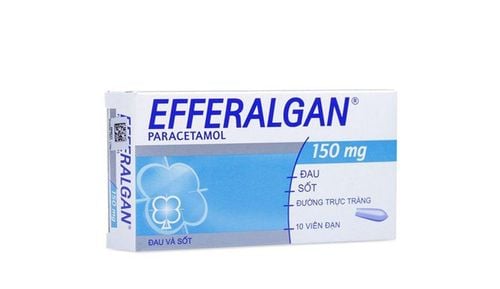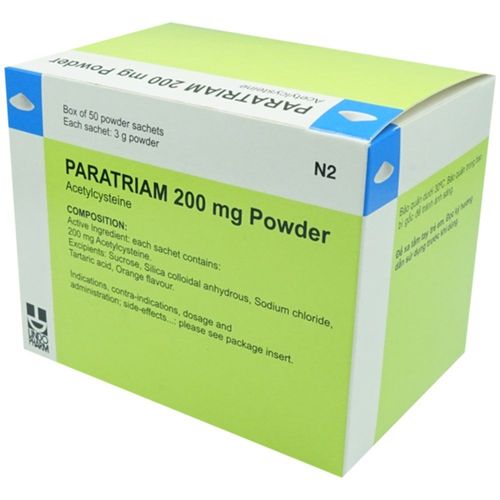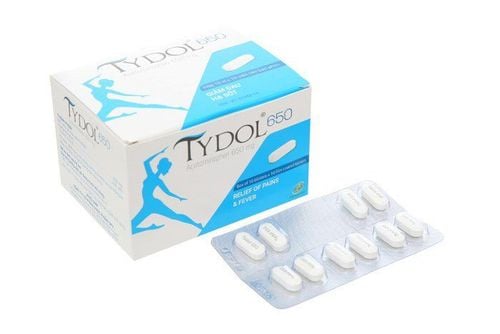This is an automatically translated article.
Cadimusol 200mg containing the active ingredient Acetylcysteine is indicated in the treatment of mucolytics in diseases with viscous mucus such as pancreatic cystic fibrosis, acute bronchitis, chronic bronchitis... Let's learn about the uses, Notes when using Cadimusol 200mg through the article below.
1. What does Cadimusol 200mg do?
Cadimusol 200mg drug is prepared in the form of capsules containing the active ingredient Acetylcysteine. Acetylcysteine has the effect of reducing the viscosity of sputum through the mechanism of separating the disulfide bridges in Mucoprotein, thereby helping to facilitate the expulsion of sputum by coughing, mechanical measures or postural drainage. In addition, Acetylcysteine is also used in detoxification due to overdose of Paracetamol by the mechanism of restoring or maintaining Glutathion concentrations in the liver.
Cadimusol 200mg is indicated in the following diseases:
Mucolytic in viscous diseases such as cystic fibrosis; Paracetamol overdose detoxification; Treatment of diseases with mucous sputum such as acute bronchitis, chronic bronchitis; Routine cleaning in bronchoscopy.
2. Dosage of the drug Cadimusol 200mg
Cadimusol 200mg is taken orally, can be taken before or after meals because bioavailability is not affected by food. Patients need to use the drug exactly as prescribed by the doctor, do not overdose or prolong the treatment time. Some recommendations on the dosage of Cadimusol 200mg are as follows:
Dose of mucolytic drug in some diseases: Adults take 1 tablet / time x 3 times / day. Children from 2 to 6 years old take 1 tablet/time x 2 times/day; Antidote dose when overdose Paracetamol: The starting dose of Cadimusol 200mg is 140mg/kg, repeat the dose after 4 hours. The dose was then increased to 70 mg/kg body weight, repeated 17 times. Patients with Paracetamol poisoning should be given Acetylcysteine as soon as possible, preferably within 8 hours of paracetamol overdose. Overdose of Cadimusol 200mg can cause symptoms similar to anaphylaxis and tend to be much more severe (especially symptoms of hypotension). Signs of overdose include respiratory failure, hemolysis, renal failure, and disseminated intravascular coagulation. There have been reports of death during treatment with Paracetamol toxicity. Therefore, in case of overdose and serious side effects appear, the patient should stop using the drug and notify the treating doctor.
3. Side effects of the drug Cadimusol 200mg
Cadimusol 200mg can cause some unwanted effects as follows:
Common: Headache, tinnitus, drowsiness, stomatitis, urticaria, runny nose; Rare: Fever, bronchospasm, anaphylactic reactions, chills. In case of experiencing side effects, the patient should stop using Cadimusol 200mg and notify the treating doctor for timely treatment.
4. Notes when using Cadimusol 200mg
Contraindicated to use Cadimusol 200mg in the following cases:
Patients with hypersensitivity to Acetylcysteine or any component of the drug Cadimusol 200mg; People with a history of bronchial asthma or bronchospasm; Children under 2 years old. Precautions for use:
Patients at high risk of asthma attacks should be closely monitored during treatment with Cadimusol 200mg. In case of bronchospasm, bronchodilator nebulizer should be used such as Salbutamol, Ipratropium and Acetylcysteine should be discontinued. Treatment with Acetylcysteine will produce thin sputum in the bronchi, in case the patient has a reduced ability to cough, it is necessary to get all the sputum out by other methods. For pregnant women: Cadimusol used in pregnant women for the purpose of treating Paracetamol overdose is safe and effective, preventing liver toxicity for the mother's fetus. For women who are breastfeeding: Cadimusol 200mg is safe to use in this population. Drivers and machine operators: Cadimusol 200mg does not affect the patient's ability to drive or operate machinery. Store Cadimusol 200mg at room temperature, away from sunlight and high humidity.
5. Drug interactions
Acetylcysteine is a reducing agent, so it can interact with oxidizing drugs. Cadimusol 200mg drug interacts with cough medicine, preparations to reduce bronchial secretion. Avoid concurrent use of Cadimusol 200mg with drugs containing metal ions such as Nickel, iron, copper, rubber... Cadimusol is physically and chemically similar to the following drugs: Tetracycline, Penicillin, Oxacillin, Sodium Penicillin, Amphotericin B, Oleandomycin. Tryosin, Iodine and Hydrogen peroxide interact to reduce the effect of Acetylcysteine. Drug interactions occur that reduce the therapeutic effect of Cadimusol 200mg, increase the risk of unwanted effects. Therefore, patients need to inform the treating doctor about the drugs being treated (over-the-counter drugs, prescription drugs) and functional foods before being treated with Cadimusol 200mg to ensure the safety and effectiveness of treatment. treat. Above is the information related to the drug Cadimusol 200mg. To ensure the safety of your health and maximize the effectiveness of treatment, you need to take the medicine exactly as directed by your doctor.
Please dial HOTLINE for more information or register for an appointment HERE. Download MyVinmec app to make appointments faster and to manage your bookings easily.













